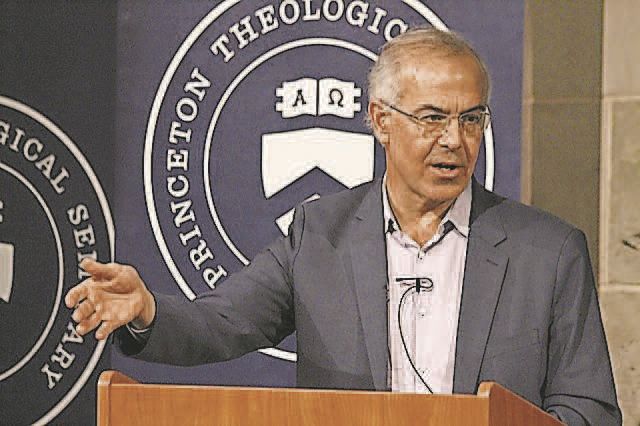By Philip Sean Curran, Staff Writer
New York Times columnist David Brooks said Tuesday in Princeton that the nation needs to find ways to “rebind the social fabric” after a presidential election that was a manifestation of a “bifurcation” within society.
“And so to me, the significant thing politically that’s happened is we used to be a country where left fought right, big government versus small government. And we’ve become a country where open fights closed,” he said in a speech at the Princeton Theological Seminary.
For roughly an hour, he talked and took questions inside the seminary’s library on his impressions of America, a country where he finds many are feeling a sense of loneliness and detachment, a decline in marriage and a rise in suicides.
Some, he said, have felt the “tailwinds of globalization” have lifted “them upwards” and therefore they want open borders, open trade and open social mores. But others, he said, feel the “headwinds of globalization” are “blasting in their faces.”
“And people who have been feeling invisible, who feel looked down upon, feeling moral injury and feeling an especial disillusionment of their social fabric decided they had to take desperate measures, and they did,” he said.
In his remarks, Mr. Brooks mostly avoided mentioning president-elect Donald Trump, of whom he has been critical . In his New York Times columns this year, he wrote that Mr. Trump is “epically unprepared to be president” and “psychologically off the chain.”
Visiting a liberal upper class community that heavily backed Hillary Clinton and subsequently saw students protest at Princeton University in response to Mr. Trump’s victory, Mr. Brooks offered some advice.
“And even in moments of fear and upset about the election, it is important to not broadcast one’s contempt for the people who voted for Trump and not over panic,” he said. “And I do think, what I’ve seen in the aftermath of the election, especially among the quadrant of society I work in, it’s a lot of reinforcing the animosities, often by protests and other things that assume that if you voted for Trump, you were a bigot. And a lot of people are bigots who voted for Trump, but a lot of people weren’t.”
To rebind that social fabric, he suggested having a national service program and offered that the country needs a “new anthropology, a new way to talk about who we are and a way to conceive our society in different ways.”
“And my shorthand is that we have to be more communal in an age that’s too individualistic,” he said. “We have to use a moral lens in a culture that’s too utilitarian. We have to become more emotional in a culture that’s too cognitive.”
Later in his remarks, he sought to offer a way for people to get beyond their comfort zone. He suggested that Americans have a “responsibility,” in his words, to join an organization “filled with people not like us,” such as a gun control advocate becoming part of group with Second Amendment supporters.
Mr. Brooks, 55, has spent his career in journalism. In addition to the New York Times, he is a commentator on National Public Radio, NBC and PBS, the author of three books and teaches a course at Yale University.
In speaking to a seminary audience, he infused his speech with religious imagery, of a “calling” that he had to try the shift the culture into moral discourse and “reintroduce concepts like sin and redemption and grace into the public conversation.”
America, he said, is ready for more “explicit God-talk” in a country with a “spiritual hunger.”
In response to an audience member expressing fear she had, he said: “And I think when you lose that faith in the future, then the present problems become to seem more hopeless.”

